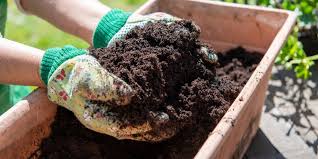Running a successful nursery requires more than just good soil and sunlight — it demands the right nutrients. Organic fertilizers for nurseries offer a sustainable, eco-friendly solution that supports healthy plant growth without harming the environment. Whether you grow ornamental plants, vegetables, or houseplants, organic options can improve soil health, boost resilience, and satisfy eco-conscious customers.

Why Choose Organic Fertilizers?
Organic fertilizers differ from synthetic ones because they come from natural sources like compost, animal manure, or plant matter. They release nutrients slowly, improving soil structure and encouraging beneficial microorganisms. This long-term approach fosters healthier root systems and more vibrant plants. In nurseries, using organic fertilizers also builds trust with customers who prioritize natural gardening practices. Overall, they provide both performance and sustainability.
Types of Organic Fertilizers for Nurseries
There are several types of organic fertilizers for nurseries, each offering different benefits. Compost is a common base, rich in nutrients and easy to make on-site. Manure from cows, chickens, or horses adds nitrogen and organic matter, but it must be aged to avoid burning plants. Bone meal and blood meal are excellent for phosphorus and nitrogen, respectively, while seaweed and fish emulsion deliver micronutrients. Choosing the right mix depends on your plants’ specific needs.
Using Compost as a Base Fertilizer
Compost is a cornerstone of organic gardening and a practical choice for nurseries. It enriches soil with nutrients, improves water retention, and supports beneficial microbes. You can make compost from plant trimmings, food scraps, and garden waste — reducing nursery waste in the process. Spread a thin layer around plants or mix it into potting soil to provide a gentle, balanced feed. Compost works well for both seedlings and mature plants, making it incredibly versatile.
Liquid Organic Fertilizers for Fast Feeding
In busy nurseries, liquid fertilizers offer a quick way to feed plants and correct deficiencies. Organic liquid fertilizers, such as fish emulsion, compost tea, or seaweed extract, are absorbed quickly through roots and leaves. They’re especially helpful for seedlings, transplants, and fast-growing annuals. When using liquid options, follow dilution instructions carefully to avoid overfeeding. Applying small doses regularly ensures even growth without shocking the plants.
How to Apply Organic Fertilizers in Nurseries
Proper application is key to getting the most out of organic fertilizers for nurseries. For container plants, mix slow-release fertilizers like compost or worm castings into the potting mix. For in-ground beds or display zones, top-dress with compost or manure and water it in. Liquid fertilizers can be sprayed on leaves or watered into the soil. Always observe how your plants respond and adjust frequency based on growth and health.
Benefits Beyond Plant Growth
Organic fertilizers offer more than just nourishment — they improve the entire nursery ecosystem. They encourage soil biodiversity, reduce runoff pollution, and help plants resist pests and diseases naturally. Unlike synthetic fertilizers, which can build up salts and damage roots over time, organic options enhance long-term soil fertility. In addition, using organic methods can be a strong selling point for your nursery, appealing to customers who value sustainable gardening.
Conclusion
Choosing organic fertilizers for nurseries is a smart move for both plant health and environmental responsibility. From compost to fish emulsion, these natural options provide steady nutrition and support long-term growth. Whether you’re managing a small backyard nursery or a large commercial operation, organic fertilizers help create a thriving, sustainable environment. In the end, healthy soil grows healthy plants — and organic feeding is a powerful step in that direction.
